Introducing Vocab
Vocab is an online vocabulary programme for all pupils in your school. Used widely by primary schools, secondary schools, multi-academy trusts and local authorities, Vocab offers tens of thousands of words and their corresponding definitions, synonyms, antonyms, example sentences, supporting images and audio support.
Vocab is one of our literacy modules, which have benefitted over 300,000 pupils over the last decade.
What are the Benefits of ReadingWise Vocab?
Vocabulary development is intimately connected to strong comprehension. Many schools integrate the teaching of vocabulary effectively into their daily practice. ReadingWise Vocab makes it much easier and quicker to develop school-wide resources to support your teachers. This leads to consistent practice, and helps your pupils to remember the new words they encounter in class and to learn and use tier 2 words that are less frequently taught.
- Bespoke: Embed the target vocabulary from your curriculum into our powerful programme. Reinforce the right words at the right time.
- Time-saving: With thousands of words already in our system, your staff can save days of preparation.
- Cross-curricular: Along with tier 2 vocabulary, the programme has thousands of subject-specific tier 3 words and phrases to support disciplinary literacy.
- Embed vocabulary in pupils' memory: The Vocab programme ensures pupils revisit words at strategic intervals to interrupt the forgetting curve and to maximise remembering.
With Vocab, you and your fellow teachers are bringing words to life in the classroom. You are providing the all important context. Then Vocab backs up your effort by helping to embed the words in pupils' long-term memories.
Delivery
It is quick and easy to set up and run Vocab in your school. Each pupil will have their own username and password. You and your staff will allocate specific word lists that you are targeting.
Short, regular sessions are most effective. We suggest 10-minute sessions 3-5 times a week ⏤ at home, at school, or a mix of both.
There are two modes to choose from when using ReadingWise Vocab.
Vocab Task Mode: You are able to set tasks (think homework) for pupils. These tasks can be allocated a due date. Many schools use this to help organise the programme to compliment their curriculum and to use the programme to harmonise and reinforce the teaching and learning happening in the classroom.
Basic Flow Mode: Alternatively, you can allocate word lists in basic flow mode. This allows pupils to progress through the target words and the system personalises the content over time to reflect their security of each word. An example of a large word list is our tier 2 word list, which has over 1,000 words. Pupils access the programme regularly and revisit words over time. At the same time, teachers can allocate a word list from a book or topic that is being studied, for example 'Holes Word List' or 'Science Year 3 Words'. Pupils would then focus on the Holes or Science words until complete, then resume the tier 2 list.
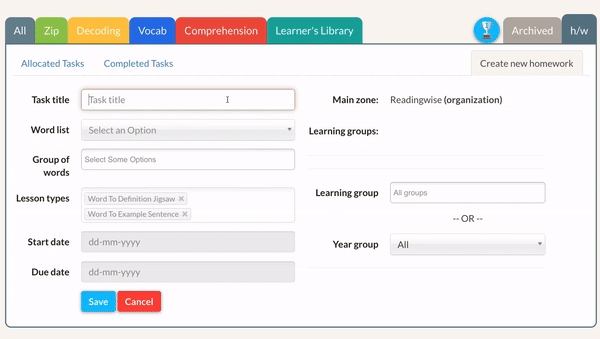
It takes seconds for a teacher to create a task.
How was Vocab developed?
We piloted Vocab with 32 schools (you can download the report below), and carefully took on feedback from regional literacy leads, teachers, and pupils. You will benefit from their expertise, as they have contributed to what is a very special vocabulary programme.
“There is much evidence – strong correlations, several causal studies, as well as rich theoretical orientations – that shows that vocabulary is tightly related to reading comprehension across the age span…”
Who is Vocab for?
Vocab is a literacy programme for pupils aged 6 - 16 (years 2 up to 11) used by primary schools, secondary schools, multi-academy trusts, local authorities, and other school groups. Teachers, literacy leads and SENDCos can decide on the target word lists, so that you can be confident that pupils are working on the vocabulary that best reflects both their needs and the needs of the curriculum. The programme comes ready with an exhaustive list of tier 2 words through to complex academic words and vocabulary from books such as 'Of Mice and Men.'
How does Vocab work?
Spaced repetition.
We tend to forget much of what we learn within 24 hours. ReadingWise Vocab reinforces words over time, thus interrupting this forgetting process, and making it easier for your pupils to more effectively remember words and grow their vocabularies.
Teachers provide context in class and the ReadingWise Vocab programme embeds the words in learners' long-term memories. This includes a revision cycle once the word is mastered.
This process is designed to interrupt the forgetting curve as per the famous image derived from Ebbinghaus' work on memory. You can read more about this here.
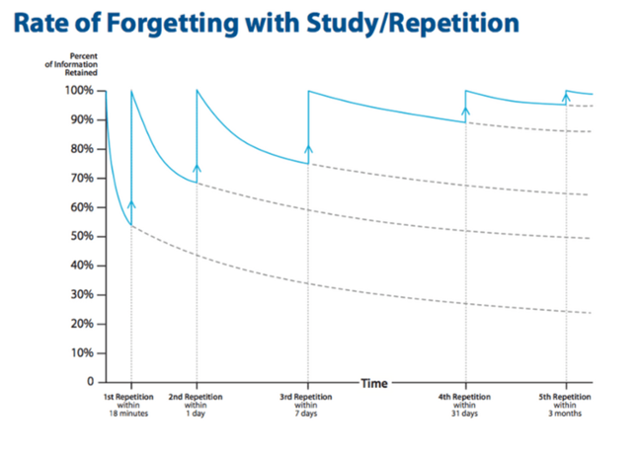
De-scaffolding.
In Basic Flow Mode, Vocab carefully de-scaffolds each word. In the first exposure, learners are provided with images, definitions, synonyms, antonyms, word types, and example sentences. As their security increases, the system 'de-scaffolds' ⏤ so at the second interaction (assuming they got it right the first time), they no longer have the images.
Please see the images below which illustrates the de-scaffolding process (not using the same target word, obviously).
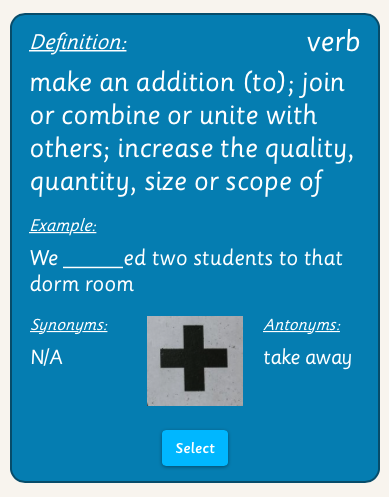
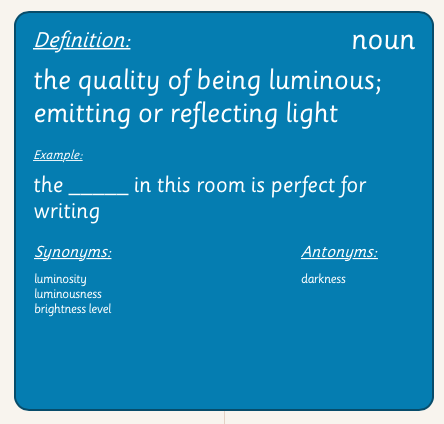
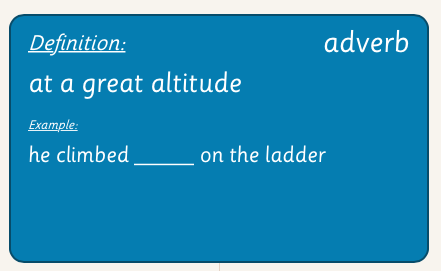
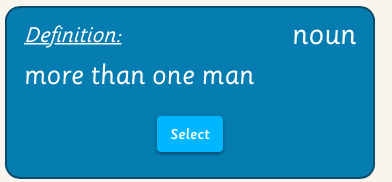
Regularity.
We recommend learners interact with the programme for 5-10 minutes, several times a week. This allows spaced learning and repetition to happen and is easy to deliver ⏤ either at school, at home, or ideally both. Pupils can login at home because every ReadingWise module that a school subscribes to comes with individual logins for students and staff.
Quizzing.
Optionally, a simple pre and post-quiz composed of 30 words from the target list helps you to gauge impact and demonstrate progress quickly and easily. You can also access information such as accuracy data, which words pupils might find most challenging, which words they seem most secure with, and much more.
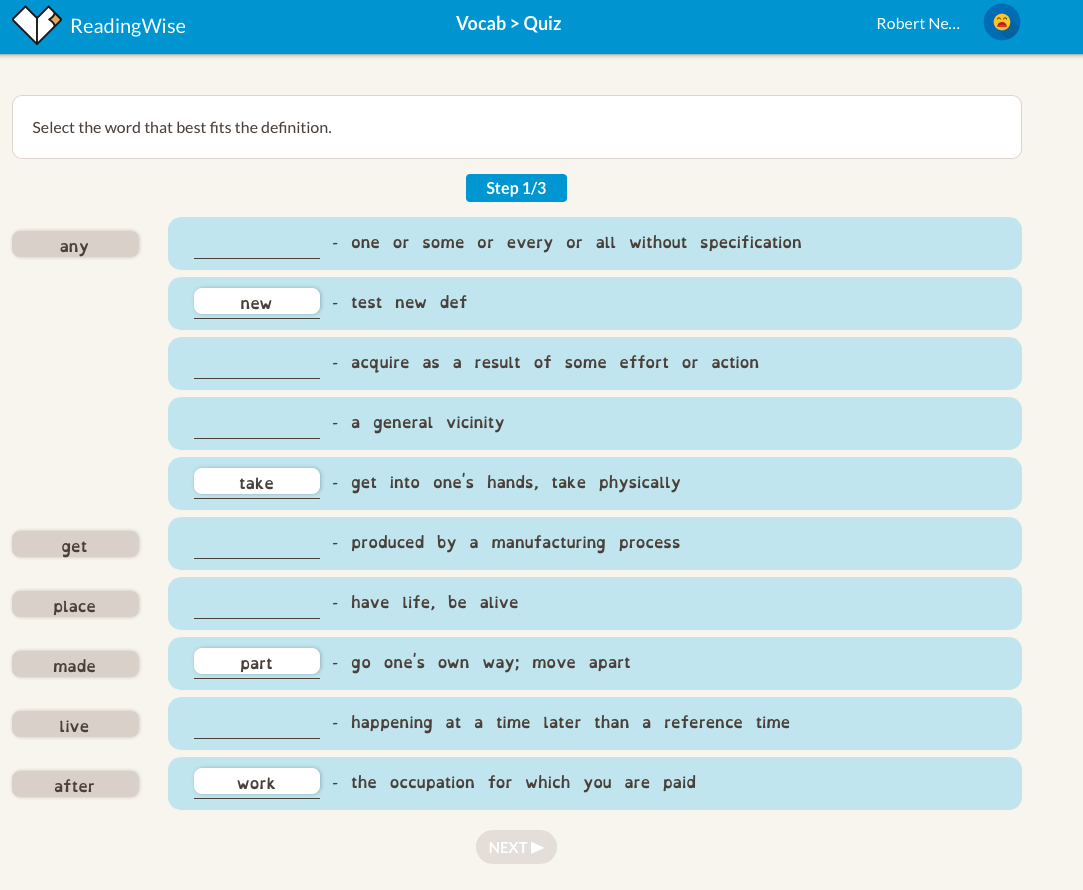
Can teachers view pupils' progress with Vocab?
With a pre and post-quiz (30 words from the word list you've selected) it’s simple for teachers, literacy leads, headteachers, TAs, and SEND specialists to gauge the impact and progress. There is also full visibility of learner activity in the comprehensive Dashboard, including time spent, login diary, and accuracy rates. You can also choose to quiz your learners at any time.
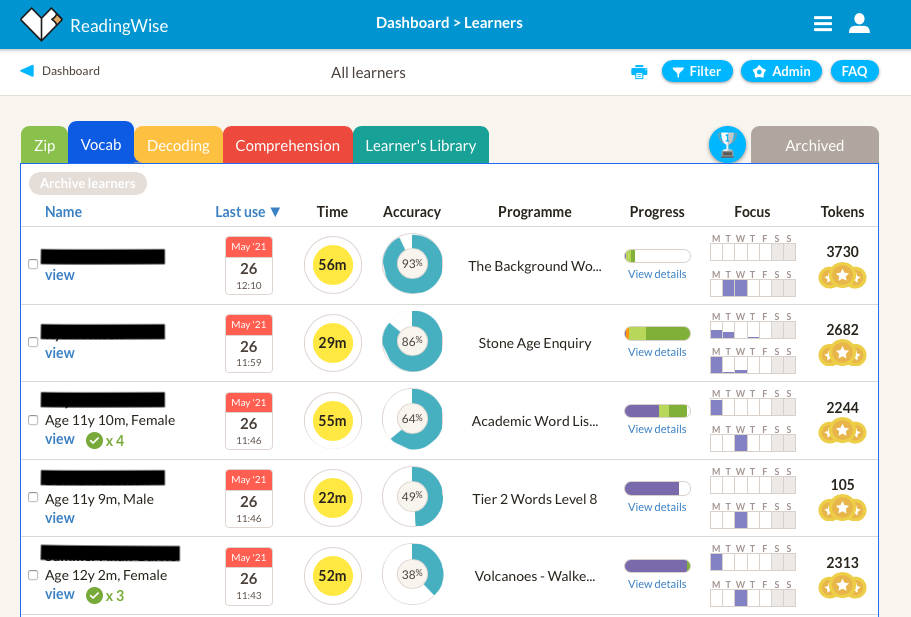
"I absolutely love the quiz elements within Vocab! The feedback I have had on this programme is excellent. Children whose motivation was poor now are loving engaging with the new progress bars - it is helping them to self-assess."
Can I customise reading content and word lists within Vocab?
Yes, you can. The key to our programme is harmonising as closely as possible with what's going on in the classroom. So if you're studying Ancient Greece then add your Greece target vocabulary to ReadingWise Vocab. You will explore words like 'democracy' or 'civilisation' in class ⏤ and Vocab will reinforce those words, consolidating your teaching.
Along with selecting your own word lists, we have also pre-prepared a large Tier 2 word list and Coxhead's Academic Words list. There are also thousands of words from books, subject areas and lists.
You can view our large tier 2 word list here.
How often should my class use Vocab?
As guidance, 10 minutes at a time for 3-5 times per week works well. This can be at home, at school, or a mix of both. Much evidence suggests shorter, more regular sessions are better than longer, irregular sessions.
Is Vocab accessible for those with dyslexia or visual impairments?
Across the UK, anywhere from 15% to 20% of children are either dyslexic or have visual impairments, according to the British Dyslexia Association (BDA). Dyslexia and visual impairments are usually picked up by schools, and this means pupils can benefit from extra resources and support as required under SEND provisions.
We work to ensure that ReadingWise is accessible for everyone by default, with dyslexia-friendly font and audio support that comes as standard. Both can make a massive difference for pupils who are struggling to read.
Is ReadingWise worth the investment?
"As a school, we ended the year 22-23 with an outstanding 90%+ fluent readers across year groups 7-11.
We made a remarkable 18% impact in reading following the launch of Star’s World Class Book Culture Programme.
Since implementing ReadingWise in our curriculum, we have observed a substantial improvement in the students' vocabulary acquisition. The interactive and engaging nature of the software has captivated their interest, making the learning process enjoyable and effective. The Vocab module has proven positive outcomes as it contributes significantly to our pupils’ overall language proficiency.
In addition to the software having a pupil-friendly interface, we have found that coupling ReadingWise programmes with regular literacy assessment has incentivised engagement for learners; the faster they progress, the quicker they graduate from the modules.”
Find out more about how ReadingWise supports multi-academy trusts (MATs).
Case Studies
See what other headteachers and literacy leads say about ReadingWise in our case studies and frequently updated testimonials.
Training for Teachers and Staff
Teachers and staff are empowered to run ReadingWise sessions through our excellent training. We provide up to two-hour training sessions depending on the module. Using ReadingWise Vocab will help upskill your staff, improve confidence and reading levels among your learners, and make reporting on impact simple. We also provide ongoing support and ensure that every programme is carefully tailored to the needs of your pupils and school.
Training can be delivered online or in-house depending on preferences and schedules.
How much does Vocab cost?
This depends on your school size and package. Please read our pricing page for more details.
Can I trial Vocab?
Yes, you can. Please register for your trial through the button below.
We highly recommend you spend 20-minutes running through the programme with our friendly and knowledgeable team by arranging a demo to suit your diary.







